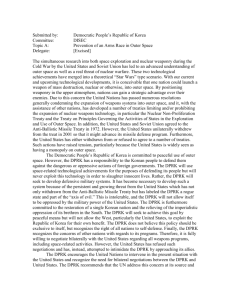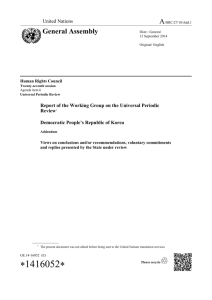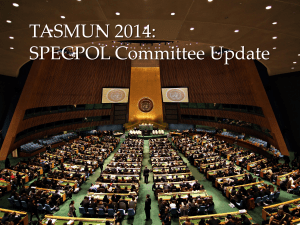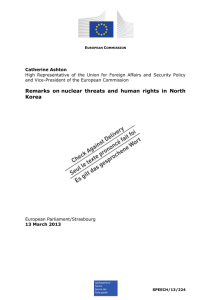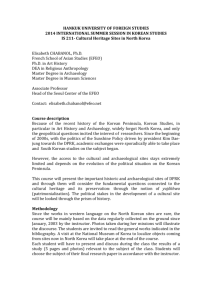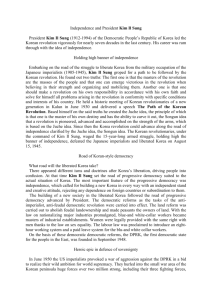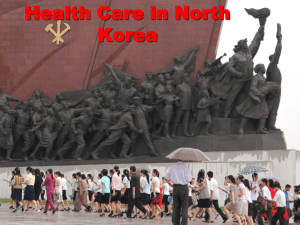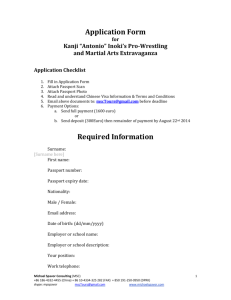INDIA-DPR KOREA RELATIONS
advertisement
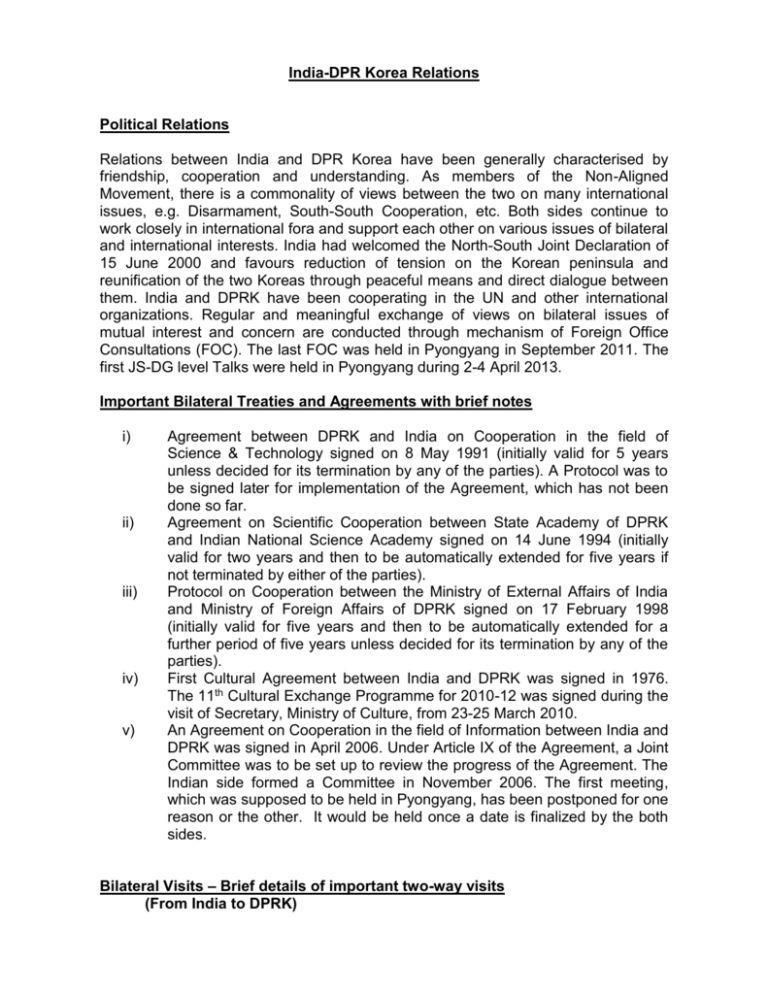
India-DPR Korea Relations Political Relations Relations between India and DPR Korea have been generally characterised by friendship, cooperation and understanding. As members of the Non-Aligned Movement, there is a commonality of views between the two on many international issues, e.g. Disarmament, South-South Cooperation, etc. Both sides continue to work closely in international fora and support each other on various issues of bilateral and international interests. India had welcomed the North-South Joint Declaration of 15 June 2000 and favours reduction of tension on the Korean peninsula and reunification of the two Koreas through peaceful means and direct dialogue between them. India and DPRK have been cooperating in the UN and other international organizations. Regular and meaningful exchange of views on bilateral issues of mutual interest and concern are conducted through mechanism of Foreign Office Consultations (FOC). The last FOC was held in Pyongyang in September 2011. The first JS-DG level Talks were held in Pyongyang during 2-4 April 2013. Important Bilateral Treaties and Agreements with brief notes i) ii) iii) iv) v) Agreement between DPRK and India on Cooperation in the field of Science & Technology signed on 8 May 1991 (initially valid for 5 years unless decided for its termination by any of the parties). A Protocol was to be signed later for implementation of the Agreement, which has not been done so far. Agreement on Scientific Cooperation between State Academy of DPRK and Indian National Science Academy signed on 14 June 1994 (initially valid for two years and then to be automatically extended for five years if not terminated by either of the parties). Protocol on Cooperation between the Ministry of External Affairs of India and Ministry of Foreign Affairs of DPRK signed on 17 February 1998 (initially valid for five years and then to be automatically extended for a further period of five years unless decided for its termination by any of the parties). First Cultural Agreement between India and DPRK was signed in 1976. The 11th Cultural Exchange Programme for 2010-12 was signed during the visit of Secretary, Ministry of Culture, from 23-25 March 2010. An Agreement on Cooperation in the field of Information between India and DPRK was signed in April 2006. Under Article IX of the Agreement, a Joint Committee was to be set up to review the progress of the Agreement. The Indian side formed a Committee in November 2006. The first meeting, which was supposed to be held in Pyongyang, has been postponed for one reason or the other. It would be held once a date is finalized by the both sides. Bilateral Visits – Brief details of important two-way visits (From India to DPRK) 1. Dr. Shanker Dayal Sharma, Vice President (April 1992) at the invitation of DPRK Vice President who visited India in May 1991. 2. Shri H.S. Surjeet, General Secretary of CPI (M) – (April 1993) at the invitation of Central Committee of Workers’ Party of Korea. 3. Shri Jyoti Basu, Chief Minister of West Bengal (May 1994) at the invitation of Central Committee of Workers’ Party of Korea. 4. Shri P. Shiv Shanker, Governor of Sikkim (August 1995) to participate on the Liberation Day of Korea. 5. Shri Mukhtar Abbas Naqvi, MOS for I&B (September 1998) to attend 6th Pyongyang Film Festival. 6. Dr. Vishwanath, Director General of International Institute of the Juche Idea (IIJI) (April 2005) to participate in the ceremony of Birth Anniversary of Kim Il Sung. 7. Shri Rajiv Sikri, Secretary (East) and Shri Ashok K. Kantha, Joint Secretary (EA) (June 2005) in connection with the Foreign Office Consultations (FOC). 8. Shri N. Ravi, Secretary(East) visited in May 2008. 9. Shri Jawhar Sircar, Secretary, Ministry of Culture, visited in March 2010. 10. Shri Sanjay Singh, Secretary (East) and Shri Sandeep Chakravorty Director(EA) visited Pyongyang in September 2011 for Foreign Office Consultations (FOC). 11. Dr Vishwanath, Director General of International Institute of the Juche Idea (IIJI) visited Pyongyang with family and friends to attend the week-long Birth Centennial ceremony of Kim Il Sung on 15 April 2012. 12. Prof. Sandip K. Mishra, Department of East Asian Studies, University of Delhi, visited Pyongyang during 3-13 March 2013, for research at various Universities and meeting with scholars from Pyongyang University. 13. Shri Gautam H. Bambawale, JS (EA). and Shri Vijai Kumar, DS(EA), Ministry of External Affairs visited Pyongyang for 1st JS-Director General level Talks during 3-6 April 2013. 14. A 3-member delegation of Hon’ble MPs - Sh. Sitaram V. Yechuri (RS); Sh. Tarun Vijay (RS); and Muhammed Hamdullah Sayeed (LS); and Sh. Vijai Kumar, DS(EA) - participated in the 60th Anniversary of the Victory in the Fatherland Liberation War during 26-29 July 2013. (High Level visits from DPRK to India) 1. 2. 3. 4. 5. 6. 7. 8. Mr. Li Gun Mo, Prime Minister (February 1988) on a goodwill visit. Mr. Li Jong Ok, Vice President of DPRK (May 1991 and March 1993). Mr. Yang Hyong Sop, Chairman, Supreme People’s Assembly (April, 1998). Mr. Choe Thae Bok, Chairman of SPA as Secretary of Central Committee of the Workers’ Party of Korea (October 1998). Mr. Pak Gil Yon, Vice Foreign Minister (April 2000). Mr. Jang Chol, Vice-Chairman of Supreme People’s Assembly (January 2003). Mr. Choe Chang Sik, Vice Minister of Public Health in November 2005 to attend the 3rd GAVI Partners’ Meeting held in New Delhi. Mr. Ma Chol Su, Director of 4th Department in the DPRK Ministry of Foreign Affairs (March 2006) to discuss bilateral matters with JS (EA). 9. Mr. Ri Ju Kwan, Vice-Chairman of the DPRK Information Committee (April 2006) to sign the Agreement on Cooperation in the field on Information. 10. Mr Kim Yong Il, Vice Foreign Minister, visited Delhi in May 2007 and August 2009. ITEC Assistance and programmes Since 2002-2003, five ITEC slots were being offered to DPRK. For 2004, India agreed to increase the slots from five to 10. Accordingly, 10 DPRK nationals were sent to India to participate in “Programme on Development, Implementation and Management of Computer Software Applications”, “English for Professionals” and “International Diploma Programme in Education Planning & Administration-XXI” courses in 2004-05. The ITEC slots were increased to 18 in 2008-09. Gradually, the slots have remained under-utilized; the number of slots was reduced to 10 in 201112. Since 2011-12, DPRK has been offered 10 slots and two slots for DPRK Defence personnel every year. In September 2001, DPRK requested for providing slots in Professional Course for Foreign Diplomats (PCFD) at the Foreign Service Institute. Accordingly, one slot was offered to DPRK. The DPRK side has, however, requested at least two slots as under their policy, DPRK does not depute single candidate to any foreign country. Their request was considered and two DPRK female diplomats were trained at the 40th PCFD held from 1 February 2006 to 10 March 2006. Despite our best efforts, it could not be made possible since then to accommodate two DPRK diplomats for the PCFD course. Commercial and Economic Relations - with trade, and investment details Bilateral trade between India and DPRK declined during the recent past mainly due to the latter’s inability to carry on foreign trade due to financial crunch. According to Export/Import data of MOC, India’s export to DPRK was US$ 106.30 million and import was US$ 12.48 million during the period April-September 2013. The major items exported from India to DPRK are oil-meals, cotton yarn, fabrics, made-ups etc, ores and minerals, drugs, pharmaceuticals and fine chemicals, inorganic/organic/agro chemicals, petroleum products, metals, electronic goods, nonferrous metals, machinery and instruments, gems & jewellery, dyes/antidotes and coal tar chemicals, iron and steal bar/rod etc., finished leather, chemical and allied products, primary and semi-finished iron and steal and meat and preparations. The main items of import from DPRK are iron and steel. There are certain drawbacks for trade with DPRK such as limited foreign exchange with DPRK, non-availability of direct shipping and non-guarantee of payments through an established banking and insurance system. Because of these factors, Indian exporters have not shown much enthusiasm in exploring this market. DPRK has expressed keen interest in importing consumer goods from India every year on ‘deferred payment basis’. These items include leather shoes, stockings, undergarments, school bags, bicycles, kitchen utensils, etc. They also proposed barter trade by supplying items like steel, magnesia clinker zinc, etc. in case deferred payment option is not acceptable to India. They also welcomed participation of Indian companies, Chambers of Commerce, Business houses, etc. in their annual trade fairs and various other events for promoting Indian products in DPRK market. They also welcome participation of Indian companies in joint ventures and FDI. Humanitarian Assistance India has been extending humanitarian assistance to DPRK, which has suffered food shortages during the last few years as a result of natural calamities. The DPRK authorities have expressed their gratitude for India’s humanitarian assistance to them from time to time. The assistance provided from India consisted of consignment of blankets, rice, wheat, baby food, polythene sheets, etc. In the past, India donated 2,000 MT of white rice in September 2002 and 1000 MT of rice in July 2004. 200,000 Dexamethasone 4 mg. (1 ml injection) were also provided to the DPRK. India also donated medicines for the victims of the Ryongchon train blast. DPRK was also provided 2,000 MT of rice in January 2006 as gift of Government and people of India. India had also provided food assistance worth US$ 1.00 million through WFP in 2011. DPRK Government donated US$ 30,000 to the Prime Minister’s National Relief Fund for the relief of the people affected by the Tsunami that hit India in December 2004. Cultural Relations years Incoming and outgoing cultural troupes over last few Under the Cultural Agreement between India and DPRK signed in 1976, ICCR has been sending troupes to the April Spring Friendship Art Festival in Pyongyang every year except in 2003 due to the spread of SARS epidemic in the region. A Bhangra/Giddha dance troupe participated in 2004 Spring Festival to mark the 30 th anniversary of the establishment of diplomatic relations between the two countries. Pyongyang International Film Festivals India has been participating in this biennial Pyongyang International Film Festival (PIFF) on a regular basis. Koreans are fond of Indian feature films and popular films are admired and fondly remembered by the Korean public and authorities. In the 11th PIFF, Bengali film “Ek Nadir Galpo” (Tale of a river) won the award for its music and in the 12th Film Festival in 2010, Indian feature film “For Real” won a special prize. India participated in 13th Pyongyang International Film Festival in September 2012 with altogether ten Indian movies. Mission participated with two feature films i.e. Urumi (Malayalam) and Balgandharva (Marathi) as well as one documentary on ‘Songs of Mashangva’. Korea-India Friendship Association The Korea-India Friendship Association was established in February 1970 by the Committee for Cultural Relations with Foreign Countries (CCRFC) to foster friendly relations and to project India’s cultural image in DPRK. The Association is the nodal point for interaction between the Mission and the CCRFC, which is the counterpart of our ICCR. The Association has been organizing events from time to time for promoting relations between the two countries. The Association runs a Friendship School, a Farm and a Shoe Factory. India donated 100 Kg of wheat seed in March 2006. Computers and Audio Visual equipments were also donated to the IndiaDPRK Friendship School in August 2006. Department of Culture had been sanctioning Grant-in-Aid to the tune of Rs. 50,000/- to the Association up to 200910. In 2010-11, a cheque of Euro 2000/- was given to the Association in 2010 under the sanction of the Ministry of Culture. This financial year (2013-14) also, Ministry of Culture sanctioned a Grant-in-Aid of Rs.5 lakh. 40th Anniversary of establishment of diplomatic relations between India and DPRK To commemorate the 40th anniversary of the establishment of diplomatic relations between India and the DPR Korea (10 December 2013), the Mission donated 300 Hindi Books and software (Hindi Adhyapak) to the Pyongyang University of Foreign Studies (PUFS) on 28 October 2013, screened Indian feature film ‘Taare Zameen Par’ in association with Cultural Committee for Relations with Foreign Countries (CCRFC) and DPR Korea-India Friendship Society on 27 November 2013 which was attended by Diplomatic Missions and UN Agencies in Pyongyang, including 80 prominent DPRK citizens and members of Korea-India Friendship Association. To conclude the series of events, Ambassador hosted a banquet reception on 12 December 2013 for DPRK dignitaries, Heads of Mission, UN Agencies in Pyongyang where DPRK Foreign Minister was the Chief Guest. Indian Community There are about 12 Indians working for UN Agencies viz, UNDP, WFP, UNICEF, WHO, UNFPA and FAO and several NGOs like EUPS and IFRC in Pyongyang. Air links with India/Convenient Travel Routes There is no direct air connection between India and DPRK. One can travel via Hong Kong or by a direct flight to Beijing. Air Koryo operates flights from Beijing thrice a week on Tuesday, Thursday and Saturday. Air China operates two flights in a week on Monday and Tuesday during summer between March and October. Train service between Beijing to Pyongyang is four times a week (Monday/Wednesday Korean train and Friday/Saturday Chinese train). -------03 Jan 2014
